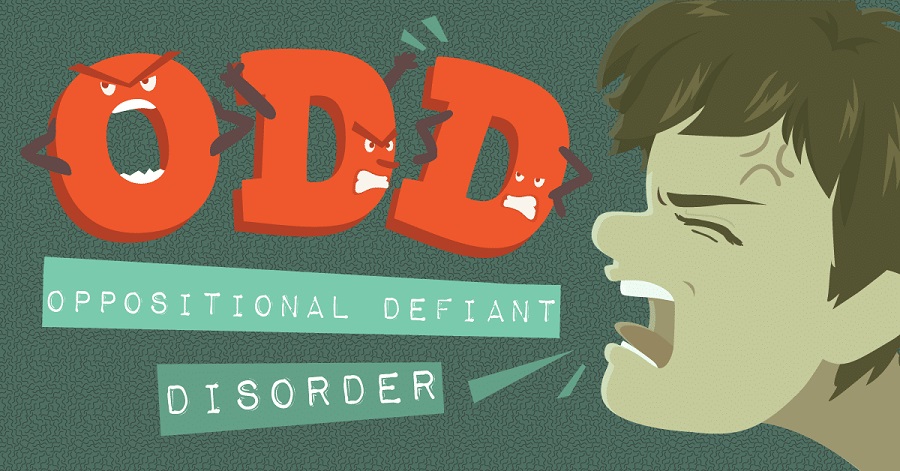
Overview
Oppositional defiant disorder or ODD is a type of behavioural disorder that affects children. It’s believed that between two to sixteen percent of children and teenagers suffer from the condition, which typically starts around the age of eight. In younger children it is more common in boys, affecting twice as many boys than girls, but by the time they are teenagers it affects them in more equal numbers.
The condition should not be confused with developmental stages that most children will go through such as the “terrible twos” or when they are teenagers. During these periods of development it’s not unusual for them to express defiance either by being disobedient, talking back or challenging their parents or teachers. With ODD children will display a continuing pattern of angry, vindictive, combative or defiant behaviour that persists for a period of over six months, towards their parents or other adults in positions of authority.
The emotional and behavioural issues in children with ODD can have a negative impact on their family and social life, as well as their education. It can sometimes be difficult to tell the difference between a child who is just strong willed, and a child who is presenting symptoms of ODD. The condition can be mild where symptoms only occur in one setting, such as just in the family home or when they are with their peers, or whilst at school. In moderate cases it will occur in at least two settings and in severe it would be in three or more.
Signs, symptoms and characteristics of ODD
Whilst ODD usually starts around the age of eight it can be found in children as young as three years old. Children with ODD can:
- Frequently be angry, resentful, touchy, irritable, impatient or argumentative
- Struggle with mood swings and a short temper or have temper tantrums
- Actively disregard or question rules and refuse to comply
- Will blame others for their bad behaviour or mistakes
- Argue excessively with figures of authority and often refuse to do what adults ask them too
- Be vindictive and spiteful especially when they are frustrated or angry and are easily annoyed by others
- Swear or use foul language
- Display a pattern of behaviour intended to annoy, upset or anger other people
- Can have symptoms of low self-esteem
Risk Factors of ODD
Some children with ODD can also have or develop other mental health conditions, which can include:
- ADHD (attention-deficit hyperactivity disorder)
- Anxiety disorders
- Depression
- Impulse control disorders
- Learning and communication disorders
- OCD (obsessive compulsive disorder)
It’s believed that around thirty percent of children who have ODD, develop a more serious behaviour disorder known as conduct disorder. Conduct disorder is characterised by antisocial and aggressive behaviours, which can include bullying, lying, stealing, vandalism, being cruel or sadistic to animals or people, and even physical or sexual abuse of others.
Causes of ODD
There is no known single cause for a child developing ODD it’s believed that a combination of factors could contribute to its development, including:
Environmental factors, such as having had poor parenting, or a lack of supervision, or overly harsh discipline by your carers. If you suffered neglect or abuse during your childhood or witnessed violence. Family instability because of financial insecurity, or having your parents’ divorce resulting in having to move home or schools frequently.
Family history, if you had family members with a history of mental health issues such as anxiety, personality or mood disorders or substance or alcohol abuse.
Genetic factors like brain chemicals or neurotransmitters that don’t function properly, and affect how the brain sends and interprets information, which can affect a person’s behaviour. Temperament or natural personality traits could also affect the likelihood of it developing. Suffering damage or injury to the brain can also lead to behavioural problems.
Complications
Children and teenagers with ODD can often have problems at home with their siblings, parent or caregivers, or at school with teachers or authority figures. This can lead to:
- A decline in school or work performance
- Antisocial behaviour
- Issues with the law
- Problems with impulse control
- Struggling to make friends and maintain relationships
- Substance misuse
- Suicidal thoughts or attempts
Diagnosis
If you think that your child may have ODD you should see your health practitioner who will refer them to the appropriate specialist. The condition can be diagnosed by either a child psychologist, child psychiatrist or paediatrician that specialises in behavioural disorders. They will examine your child and assess their overall health, family situation and interaction, the frequency and severity of their symptoms, and their emotions and behaviours in different settings. Once they have ruled out any other physical or mental health conditions or learning or communication issues they can make a diagnosis.
Treatment
There are a variety of factors that can affect the type of treatment a child with ODD will receive. This will include the severity of their symptoms as well as their age, and if they have any other conditions such as ADHD or OCD. Therapy can consist of a combination of therapies depending on how well the child takes to and responds to them. They can include therapies such as:
- CBT (Cognitive behavioural therapy)
CBT is a form of therapy that helps to retrain the way someone thinks and behaves and to encourage more positive behaviours and less negative ones.
- Family therapy
Can help improve communication and family interactions, it can include PMT (parent management training) which is a technique that teaches parents how to positively alter their child’s behaviour through the use of a more constructive form of discipline.
- Psychotherapy
Is a type of talking therapy which aims to help children develop more effective coping, social and problem solving skills. It also helps them to find better ways to control and express their anger.
Prognosis
Whilst children with ODD can face problems with relationships and their education, mild to moderate cases can often improve with age, and only severe cases are at risk of developing conduct disorder. Early diagnosis and treatment can only improve the prognosis. Written by Jan, Jeana and Wendy at Barnsley Hypnosis and Counselling (UK). For more free Information click above link.







